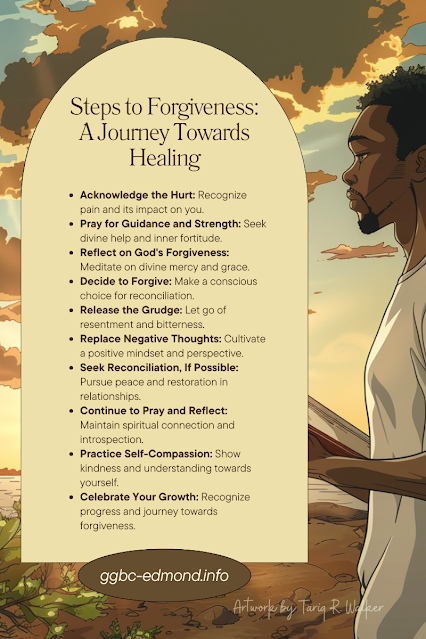Forgiveness can be a challenging process, but it is essential for spiritual growth and peace. Here is a step-by-step guide on how to forgive, along with relevant Bible verses:
Step 1: Acknowledge the Hurt
Bible Verse:
- "Bear with each other and forgive one another if any of you has a grievance against someone. Forgive as the Lord forgave you." - Colossians 3:13
Explanation: Recognize and admit that you have been hurt. Understanding and accepting your emotions is the first step towards healing. Ignoring or suppressing your feelings can lead to deeper emotional wounds. Acknowledging the hurt allows you to confront it honestly and prepare for the process of forgiveness.
Action:
- Take time to reflect on your feelings and write them down. Identify the source of the hurt and how it has affected you.
Bible Verse:
- "But I tell you, love your enemies and pray for those who persecute you." - Matthew 5:44
Explanation: Pray to God, asking for the strength to forgive and the wisdom to understand why forgiveness is important. Prayer opens your heart to God’s guidance and helps you gain the spiritual strength needed to let go of hurt and resentment. It’s through prayer that you can find peace and clarity in difficult situations.
Action:
- Spend a few minutes each day in prayer, specifically asking God for help in forgiving the person who hurt you.
Bible Verse:
- "Be kind and compassionate to one another, forgiving each other, just as in Christ God forgave you." - Ephesians 4:32
Explanation: Remember how God has forgiven you for your sins. Reflecting on His grace can inspire you to extend the same grace to others. Understanding the depth of God's forgiveness towards you can create a sense of humility and compassion, making it easier to forgive others.
Action:
- Meditate on Bible passages about God’s forgiveness. Write down examples of how God has forgiven you in the past.
Bible Verse:
- "For if you forgive other people when they sin against you, your Heavenly Father will also forgive you." - Matthew 6:14
Explanation: Make a conscious decision to forgive. Forgiveness is a choice, not just a feeling. Commit to this decision, even if your emotions haven't caught up yet. Deciding to forgive is a powerful step that initiates the healing process, even if it takes time for your heart to align with your decision.
Action:
- Verbally express your decision to forgive, either by saying it out loud or writing it in a journal.
Bible Verse:
- "Do not repay anyone evil for evil. Be careful to do what is right in the eyes of everyone." - Romans 12:17
Explanation: Let go of any desire for revenge or holding a grudge. Trust that God will handle justice in His way and time. Holding onto grudges keeps you bound to the past and hinders your emotional and spiritual growth. Releasing the grudge frees you and allows God to work in your life and the lives of others.
Action:
- Perform a symbolic act of letting go, such as writing your grudge on a piece of paper and then tearing it up or burning it.
Step 6: Replace Negative Thoughts
Bible Verse:
- "Finally, brothers and sisters, whatever is true, whatever is noble, whatever is right, whatever is pure, whatever is lovely, whatever is admirable—if anything is excellent or praiseworthy—think about such things." - Philippians 4:8
Explanation: When negative thoughts about the person or the situation arise, consciously replace them with positive or neutral thoughts. Focus on things that are uplifting and true. By changing your thought patterns, you create a more positive mindset that supports forgiveness and personal peace.
Action:
- Create a list of positive affirmations or Bible verses that you can refer to when negative thoughts come up.
Bible Verse:
- "If it is possible, as far as it depends on you, live at peace with everyone." - Romans 12:18
Explanation: If appropriate and safe, seek to restore the relationship. This might mean having a conversation with the person who hurt you to express your feelings and discuss a path forward. Reconciliation can be a powerful step in the forgiveness process, promoting healing for both parties involved.
Action:
- Reach out to the person who hurt you to arrange a time to talk. Approach the conversation with an open heart and a willingness to listen.
Bible Verse:
- "Therefore, as God’s chosen people, holy and dearly loved, clothe yourselves with compassion, kindness, humility, gentleness and patience." - Colossians 3:12
Explanation: Keep praying for the person who hurt you and for your own heart to heal. Reflect regularly on your progress and God’s love for you and the other person. Continuous prayer and reflection keep you connected to God and aware of His presence in your journey of forgiveness.
Action:
- Set aside regular times for prayer and journaling about your forgiveness journey.
Bible Verse:
- "The Lord is close to the brokenhearted and saves those who are crushed in spirit." - Psalm 34:18
Explanation: Be kind to yourself as you work through the process of forgiveness. Understand that it takes time and that it’s okay to seek support from trusted friends, family, or counselors. Practicing self-compassion helps you remain patient and understanding with yourself as you navigate this emotional journey.
Action:
- Engage in activities that nurture your well-being, such as reading, exercise, or talking with a supportive friend.
Bible Verse:
- "But the fruit of the Spirit is love, joy, peace, forbearance, kindness, goodness, faithfulness, gentleness and self-control." - Galatians 5:22-23
Explanation: Recognize and celebrate the progress you’ve made in forgiving. Appreciate the peace and freedom that come with letting go of resentment. Celebrating your growth reinforces your commitment to forgiveness and helps you acknowledge the positive changes in your life.
Action:
- Treat yourself to something special or write down the milestones you’ve reached in your forgiveness journey.











No comments:
Post a Comment
Note: Only a member of this blog may post a comment.